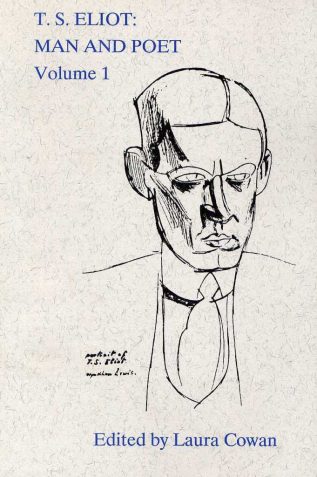
Purchase
T. S. Eliot: Man and Poet is the 11th book in the National Poetry Foundation’s Man/Woman and Poet Series and the fourth commemorative centennial work. Its tone is—appropriately—celebratory. More than one hundred years after his birth (and twenty-five years after his death), Thomas Steams Eliot remains arguably the leading English or American poet of the twentieth century and the author of undeniably its most influential poem. His poetry and criticism were so rapidly and completely enshrined that they—and the New Critical principles of interpretation that they engendered—dominated both poetry and its analysis until well into the 1970s. The echoes of his influence still resound.
The twenty-two essays in this collection testify to the wealth of contemporary criticism and also to the still rich potential of Eliot’s work. The articles, which cover his poetry, plays, and criticism, range widely in both subject and method.
Volume One contains contributions by: Richard Badenhausen, Shyamal Bagchee, Joseph Bentley, Jewel Spears Brooker, Ronald Bush, Barbara Everett, Harvey Gross, Joan Fillmore Hooker, Cleo McNelly Keams, Hugh Kenner, Edward Lobb, James Longenbach, Louis Martz, James E. Miller, Jr., A. D. Moody, Russell Elliott Murphy, Jeffrey M. Peri, J. P. Riquelrne, Sanford Schwartz, Mohammad Shaheen, Richard Shusterman, and W. B. Worthen.
Contents
“A Shape and a Significance”: Eliot’s Works in General
A.D. Moody, “Eliot’s Formal Invention”
Ronald Bush, “‘Turned Toward Creation’: T.S. Eliot, 1988”
James Longenbach, “Uncanny Eliot”
Hugh Kenner, “Eliot and the Voices of History”
Russell Elliott Murphy, “Eliot’s Grandchildren: The Poet of The Waste Land and the Generation of the Sixities”
Shyamal Bagchee, “Eliot’s ‘Only’ (and ‘All’)”
“The Whole of Literature: A Simultaneous Existence”: Eliot and Foreign Works
Harvey Gross, “Compound Ghost, Triple Devil, Terminal Books”
Joan Fillmore Hooker, “Visions and Revisions: ‘Gerontion’ in French”
Mohammad Shaheen, “Eliot in Modern Arabic Poetry”
“The Three Voices”: Eliot’s Individual Works
Early Poetry
Edward Lobb, “Chamber Music: Eliot’s Closed Rooms and Difficult Women”
The Waste Land
Joseph Bentley and Jewel Spears Brooker, “How to Read the End of The Waste Land”
Ash-Wednesday
Louis L. Martz, “Ash-Wednesday: Voices for the Veiled Sister”
Four Quartets
Barbara Everett, “East Coker: The Village of the Heart”
Cleo McNelly Kearns, “Doctrine and Wisdom in Four Quartets”
James E. Miller, Jr., “Four Quartets and an ‘Acute Personal Reminiscence’”
Drama
Richard Badenhausen, “‘When the Poet Speaks Only for Himself’: The Chorus as ‘First Voice’ in Murder in the Cathedral”
W.B. Worthen, “Murder in the Cathedral and the Work of Acting”
“A Distinctive Activity of the Civilized Mind”: Eliot’s Criticism
J. P. Riquelme, “Aesthetic Values and Processes in Eliot, Arnold, and the Romantics”
Sanford Schwartz, “T.S. Eliot and the Revolt Against Dualism: His Dissertation on F.H. Bradley in Its Intellectual Context”
Jeffrey M. Perl, “A Post-War Consensus”
Richard Shusterman, “Reactionary Meets Radical Critique: Eliot and Contemporary Cultural Criticism”
